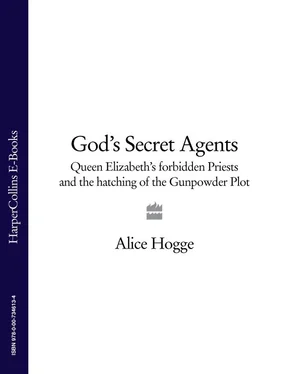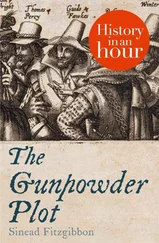So at the beginning of 1588 the odds on the Deity being a Spaniard were temptingly short. ‘Pray to God’, wrote one member of the Armada force, ‘that in England he doth give me a house of some very rich merchant, where I may place my ensign.’ Indeed, for all those about to embark with the Armada, England was a place of lucrative spoils and members of the fleet were delighted by how easy it was to obtain credit on the eve of sailing. Many spent their money on fine clothes for the occasion and one returning Englishman reported that ‘the soldiers and gentlemen that come on this voyage are very richly appointed’. If the hard-headed bankers of Europe were putting their money on an easy victory for Spain, it was small wonder that in December 1587 a false rumour that the Spanish were coming sent the population of England’s coastal towns flying inland for protection. 8
As May 1588 gave way to a blustery June, a cargo ship under Captain Hans Limburger made its way slowly north from Cadiz, bound for the Hanseatic port of Hamburg. At Cape Espichel, just south of Lisbon, Limburger saw a sight that stunned him. Although Spain’s preparations were no secret to anyone in Europe, nothing had prepared the German captain for this. For one whole day Limburger’s ship beat slowly past the assembled Spanish fleet, ‘the ocean groaning under the weight of them’. At Plymouth Limburger was able to give the port authorities the confirmation they needed: the Armada was under sail and on its way. 9
Now, after many months of uncertainty, the orders were finally given for all army officers to remain on call and for all troops to be ready to move at an hour’s notice. The better-trained soldiers were positioned near the most likely landing sites, to attack the invasion force while it was disembarking and at its most vulnerable. Barriers of logs and chains were brought in to seal off main roads and all routes into towns and cities. Militia groups were instructed in the scorched-earth policy they were to employ should the Spanish once get a foothold on land. Strategic points such as bridges and fording places were put under guard and instructions were given that in the coastal towns and villages no one was allowed to leave once the warning beacons had been lit, under pain of death. Then the nation waited. 10
For now the bad weather Emperor Rudolf had seen written in the night skies and that had blown and sobbed its way through Europe for the better part of the year began to play its part in the conflict, breathing new life into the spectres of Regiomontanus’ prophecy. By the end of June the Spanish fleet was still holed up in the port of Corunna as storms swept the Iberian coastline. A month later it was the English Navy’s turn to suffer the high winds and heavy seas as it carried out its daily patrol of the western reaches of the English Channel. ‘I know not what weather you have had there,’ wrote Admiral Lord Howard of Effingham, commander of the fleet, to Sir Francis Walsingham, Principal Secretary of State, at court, ‘but there never was any such summer seen here on the sea.’ With the waiting came the whispering. ‘There has been a rumour at Court, which has spread all over London,’ reported Philip II’s eyes and ears in the English capital, ‘that the Spaniards have orders from their King to slaughter all English people, men and women, over the age of seven years.’ 11
Finally on Friday, 29 July the Armada was sighted off the Cornish coastline, and for Howard, Hawkins, and Drake, and the men of the English Navy, battle commenced. Throughout the following week, between contrary winds and dead calms, the smaller, more mobile English vessels harried their larger, cumbersome Spanish counterparts the length of the Channel, trying at every turn to disrupt the tightly packed crescent formation adopted by the Armada fleet. Shrouded in a heavy pall of gunsmoke it was hard enough for those in the thick of each encounter to know what was going on about them, but for those onshore and far inland the desperate clawing into wind to gain the advantage, the agonizing and hypnotic slowness of the combatants closing on each other, the silence broken by the roar of gunfire, was all a distant, disconnected dream. In mainland Europe rumour had the Armada safely landed in a defeated, humbled England, with a captive Queen Elizabeth on her way to Rome, to appear, barefoot and penitent, before Pope Sixtus. In England they kept on waiting. 12
On Saturday, 6 August at 5 p.m. the Spanish fleet dropped anchor off Calais to make contact with the Duke of Parma. About midnight on the following day the tide turned, bringing with it, blazing out of the darkness, English fireships, packed with explosives, and in panic the Spaniards cut their cables and fled. The last chapter in the Armada’s story had begun. ‘From this piece of industry,’ wrote one Spanish officer, ‘they dislodged us with eight vessels, an exploit which with [our] one hundred and thirty they had not been able to do nor dared to attempt.’ What the fireships started, the storm-force winds now continued, sweeping the scattered Spanish fleet first towards the shoals of the Zeeland banks and then helplessly northwards up the English coast. For another Spanish officer this had become ‘the most fearful day in the world’. The Duke of Medina Sidonia, the Armada’s ill-fated and much maligned commander, now placed himself squarely in the hands of ‘God and His Blessed Mother to bring him to a port of safety’. * 13
The report of the Armada’s inadvertent flight north reached Queen Elizabeth as she was addressing her troops at Tilbury camp on 18 August, more than a week after the event. But even this good news did not come rumour-free, for now the Duke of Parma and his army were said to be on their way across the Channel. It was not until the end of August that the Dean of St Paul’s was ordered to announce officially that the Armada had been defeated and Philip II’s agent in London was able to write home to Spain on 7 September that ‘the Lords of the Council went to St Paul’s to give thanks to God for having rescued the realm from its recent danger’. Just three days later, though, another alarm was spread that the Armada was on its way back. By the beginning of November, after ten weeks of continued uncertainty, the public’s nerves were frayed to unravelling point. Parliament, which was to have met on 12 November, was prorogued until February ‘as it was seen that both people and nobles were weary of so much trouble’, wrote Marco Antonio Micea, a Genoese resident in London. ‘We are in such alarm and terror here that there is no sign of rejoicing amongst the Councillors at the victories they have gained. They look rather like men who have a heavy burden to bear.’ Even Elizabeth, who was not normally chary when it came to her own personal safety, was persuaded by her Council to stay away from St Paul’s ‘for fear that a harquebuss might be fired at her’. Micea noted that the fifty-five-year-old Queen looked ‘much aged and spent’. Perhaps the Spanish fleet had made for Scotland and had succeeded in persuading King James VI to avenge his mother, Mary, Queen of Scots’ execution of the year before; or perhaps they had rounded Scotland and were now in Ireland, stirring up trouble among the rebels there. In response to this new fear the Queen ‘sent Sir Thomas Perrot to raise 2,000 men in Wales, and take them over [to Ireland] with all speed’. The extent of Elizabeth’s anxiety may be measured by her willingness to throw yet more money at the conflict. 14
But if in England no one could quite believe they had won, on the Continent no one could believe that the Spanish had lost. The French ambassador in London had spent his summer merrily reporting stories of heavy English casualties, so when the English ambassador in Paris, Sir Edward Stafford, produced 400 pamphlets giving the English version of events, he was met with frank incredulity. ‘The English ambassador here had some fancy news printed stating that the English had been victorious,’ wrote Don Bernadino Mendoza, the Spanish ambassador in Paris, ‘but the people would not allow it to be sold, as they say it is all lies. One of the ambassador’s secretaries began to read in the palace a [report] which he said had been sent from England, but the people were so enraged that he was obliged to fly for his life.’ Only Pope Sixtus remained unimpressed by the European rumour-mill, refusing to loosen his grip on the million gold ducats he had promised Spain until he had better proof of Spanish success. 15
Читать дальше












